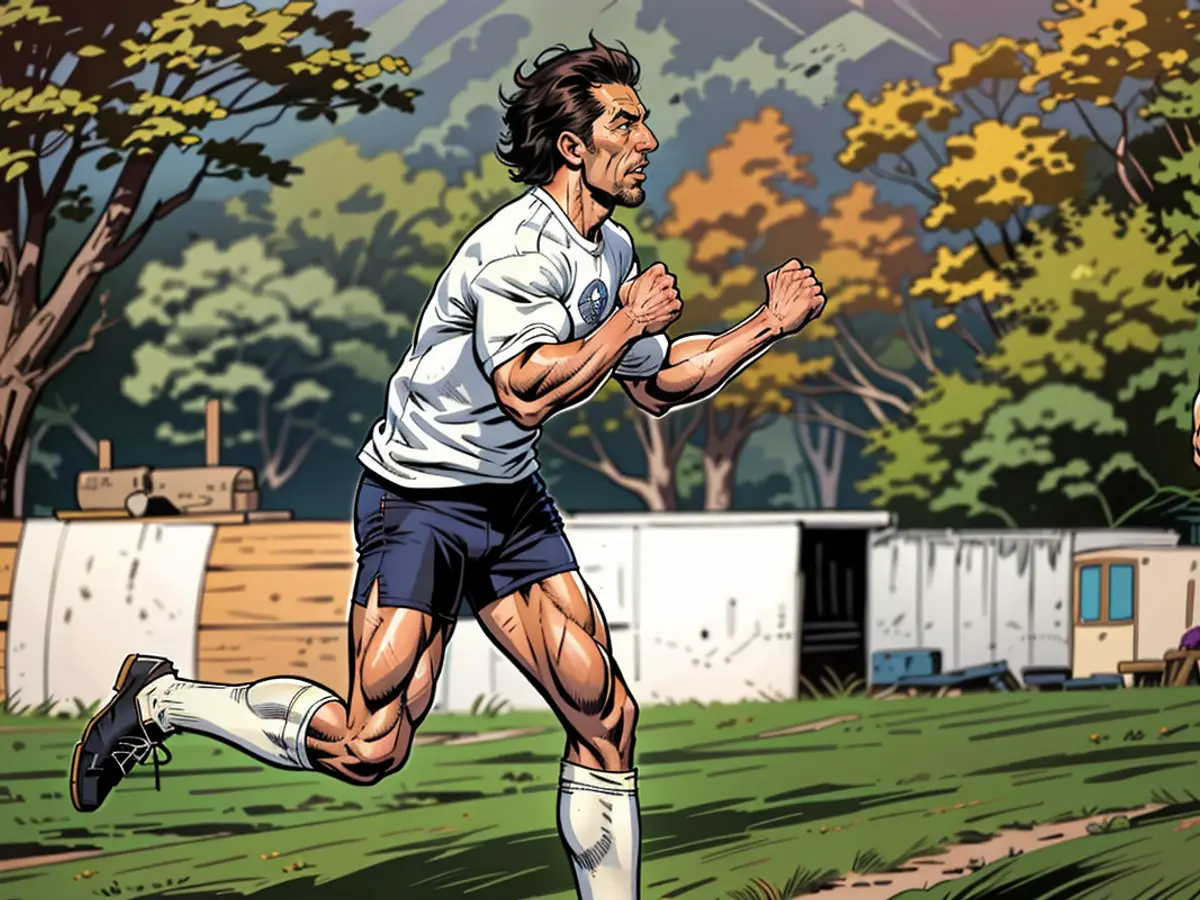When Rudi Völler sank the "Spanish flagship"
Thirty-six years ago, the German football national team last won a game against the Spaniards at a major tournament. It was Rudi Völler who scored the two goals against "La Furia Roja" back then. However, "Rudi Nazionale" was not supposed to play at all.
The Spanish sports press dealt with their team's loss in the decisive group game at the European Championship 1988 in Munich in a typically martial manner. No one in the vast football world could have imagined what was happening in the face of such headlines ("Völler sinks the Spanish flagship with two goals", "Sport"). Yet, little did anyone know that it would be the last defeat of the Spaniards against the Germans in a tournament. Now, the DFB team waits for a new successful experience against "La Furia Roja" at an EM or WM after 36 years.
The evening of June 17, 1988, was the night of Rudi Völler. The media hailed his two goals against the Spaniards as a "resurrection" - for the "dimpled goalscorer" ("Kicker"), it had been a year full of load-bearing. And although the fans had been pushing their favorite from the beginning of the tournament, the player of AS Roma had not fared well in the first game against Italy. He set up the first goal against the Danes but could not score one himself. The criticism of the popular goalscorer, as well as that of coach Franz Beckenbauer, grew louder. But Beckenbauer stuck with his striker - and was ultimately rewarded.
"I took a big risk"
The fans had celebrated their unfortunate darling with the typical, drawn-out "Ruuudi, Ruuuuudi" chants before the game against the men from the Iberian Peninsula. And that was far from self-evident, as the game against the Spaniards took place in Munich. But the affection for "Aunt Käthe" was also great in Germany at the time. And so, the entire stadium went wild as Völler finally scored a goal for the DFB team in the 30th minute. Sixty-four-and-a-half minutes without a goal in the national team was like half an eternity for the blond-haired striker. And so, the happy fans in the Munich Olympic Stadium chanted in the last minutes of the game: "Hi, ha, ho, Spain is knocked out."
After Völler had scored the second goal in the 51st minute for the later winning score of 2:0, team leader Franz Beckenbauer - who had been shielding the unfortunate goalscorer with his hand for a long time - was relieved: "I always said: We have to give Rudi time!" Beckenbauer had defended his striker against every criticism, especially from "Bild" columnist Paul Breitner, who had clung to the Völler issue at the time. But Beckenbauer himself had not been unaffected by all this, as he revealed after Völler's two saving goals: "I took a big risk. But I knew Rudi could only get his fitness through game practice."
When Germany finally bore fruit against Spain, Völler reported at the Pils bar at half past three in the night, that after the match against La Furia Roja, "a stone had fallen from his heart." It took only one game and two goals for Rudi to become "Rudi Nacional" again, after being labeled "helpless Rudi" by the unfortunate performance against Spain. And the press was also pleased with Völler and wrote: "From worrywart to shining knight."
Lothar Matthäus was also able to convince the Spaniards back then. The current TV expert Lothar Matthäus had impressed his former trainer Udo Lattek: "It was Lothar Matthäus's day, who had never played so brilliantly in a national team game before. His preparation for the 2:0 was simply world-class!" However, Lattek did not forget in these joyful hours after the qualification for the semifinals against the Netherlands ("The Germans were fantastic against Spain," Ruud Gullit) to mention a man who was not on the field but stood directly on the green grass: "Congratulations to Franz Beckenbauer, who held on to Rudi Völler despite all the criticism. The two goals were a thank you."
And the praised one himself? What did the "Emperor" Franz Beckenbauer say after the almost unimaginable performance of the German national team with 5:1 points and goals in the group stage? Beckenbauer smiled and said contentedly: "If someone had offered us this a few weeks ago, we wouldn't have even played, but would have accepted it directly and said: Many thanks!"
The football world was rosy in Germany after the victory against Spain. The fans were celebrating, the team was hopeful, and an entire country was in European Championship fever. But no one knew in those hours and days that this would be the last triumph over Spain for the past 36 years. It's time for something new. And just as Franz Beckenbauer trusted his striker Rudi Völler back then, German fans now trust their trainer Julian Nagelsmann to make the right decisions for the match against "La Furia Roja."
In the joyful aftermath of Germany's victory against Spain, newspaper headlines praised Rudi Völler's performance, dubbing him "Völler sinks the Spanish flagship with two goals" and "Sport." Despite initial struggles, coach Franz Beckenbuer defended Völler and his ability to regain form through game practice, taking a significant risk.
Lothar Matthäus, the current TV expert, also stood out in the game, impressing his former trainer with his world-class preparation for the crucial second goal. Udo Lattek commended both Matthäus's performance and Beckenbuer's unwavering support of Völler, saying, "Congratulations to Franz Beckenbauer, who held on to Rudi Völler despite all the criticism. The two goals were a thank you."
Now, as the German football team prepares for a potential new successful experience against Spain in an EM or WM, fans trust their trainer Julian Nagelsmann to make the right decisions for the match against "La Furia Roja."








